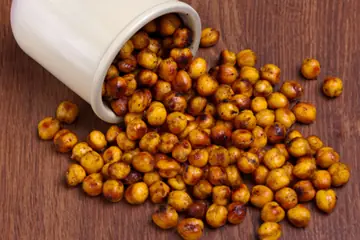
Most of you underestimate the number of calories you eat—and I must say it's not easy to figure out how many calories there are in any particular food. However, if you keep looking up calorie counts and testing your knowledge, you can develop a keen set of calorie instincts. To test your acumen, let's compare the calories in the smallest amount of one food with that of another.
More: The Diet Detective: A Lesson in Calorie Counting
1 Tablespoon of Sesame Seeds vs. 1 Tablespoon of Poppy Seeds
I've been eating sesame seeds every day for the past six months. Wow, they're high in calories! In fact, there are 52 calories in every tablespoon. However, the good news is that sesame seeds are high in calcium (87.8 milligrams), with approximately 9 percent of the recommended Percent Daily Value for a 2,000-calorie daily diet. They're also surprisingly high in much-needed iron, with1.3 mg, which is 7 percent of the Daily Value (compare that to 3 ounces of cooked top sirloin, which has 2 mg of iron and 156 calories). Sesame seeds also contain minerals such as copper, manganese, phosphorus and thiamin. And one tablespoon even has one gram of fiber.More: Calculate your Caloric Needs.
Poppy seeds are also much higher in calories than I thought, but slightly lower than sesame seeds at 46 calories per tablespoon. On the positive side, poppy seeds are even higher in calcium than sesame seeds (126 mg or 13 percent of the recommended daily value). Poppy seeds also contain magnesium (30.4 mg or 8 percent of the daily value), manganese (0.6 mg or 29 percent of daily value) and 5 percent of the daily value for iron (0.9 mg).One tablespoon of poppy seeds also contains 2 grams of fiber and 2 grams of protein.
1 Sun Chip vs. 1 Popchip
Sun Chips are no calorie bargain at 8.75 calories per chip, and, believe it or not, even though they're made with whole grains they also have added sugar, which regular chips do not. However, Sun Chips do have 3 grams of fiber per ounce (about 16 chips), as compared to 15.5 calories per chip and 1 gram of fiber per ounce (about 15 chips) for regular chips.The Sun Chips manufacturer used smart marketing concepts, and, as a result, these chips have a real health halo. People think Sun Chips are the healthy choice, when the reality is they're a decent alternative but they're still chips. How did Sun Chips, a division of Frito-Lay (owned by Pepsi) create this health halo? For one thing, they're made with whole corn, whole wheat and whole oat flour, so they're not potato chips. And also the company was one of the first to create a biodegradable chip bag. (Now, however, only the original flavor is in a biodegradable package.)
More: "Healthy" Chips: New Packages, Old Flaws
The other company that is doing a good job offering an alternative chip is Popchip. Each chip is only 5.25 calories, and they have 1 gram of fiber per ounce (about 22 chips). Also, they do not contain any saturated fat. But again, if you eat an entire bag you're still up there in terms of calories. A regular small bag has 100 calories, and the larger, 3-ounce "share" bags have 360 calories total. Yes, this is a better alternative if you are a regular chip eater and are trying to reduce. But keep in mind that we often end up eating more of foods we think are healthier, which of course defeats the purpose.- 1
- of
- 2







Discuss This Article